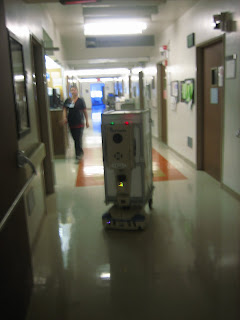We are living our own version of Hell's Kitchen at my house this week. The problem is, as I see it, that Sue and I raised our girls to be strong, independent-thinking women. We also raised them to not be afraid to speak their mind. Now that Valerie turned 21, that's pretty much what we got two of -- strong, independent-thinking women who aren't afraid to speak their minds. Make that three if you count Sue. I'd also be a strong, independent-thinking woman if I were a woman, though, in my humble opinion, I'd be substantially more controlled about speaking my mind.
Who'd've thought they'd turn those strengths against me, their great "tooter?"
Now if Sue were firing on all cylinders this would almost certainly not be an issue. But don't be fooled by the fact that she was discharged and is now at home; she's got a lot of recovering to do before she's firing on all cylinders. In fact we are all concerned about her mild state of confusion. What we are not in agreement about is what to do about it. (Note: We'll ask the local oncology doctor in a follow-up appointment tomorrow morning.)
The disagreements center principally around the administration of the multiple medications the various doctors have prescribed, and are exacerbated by our differences in communication styles. One of the daughters insists the
meds be taken strictly according to the doctors' orders. Her take-charge approach has
harkened me back to Al "I am in control here"
Haig. The other daughter has inferred a sinister belief that my lack of strict adherence to the medication orders may be a subtle plan to off my wife, and/or that my failure to strictly document every medication administered by me may be a subtle plan to have my daughters off my wife by having them
overmedicate her. The patient, herself, periodically wants to refuse some of the medications and insists on understanding the name and purpose of each medication -- four times a day.
During Sue's stay at the UCSF medical center, the nursing staff and doctors were fairly quick to acquiesce if the patient refused a medication. Such acquiescence is consistent with the
UCSF Patients' Bill of Rights, and in particular the
patient's right of "participation in decisions about treatment options, benefits, risks and alternatives including appropriate pain management." The UCSF patients' rights document states: "We respect the rights of each patient. We are aware that each patient has unique and diverse health care needs. We encourage a partnership between you and your health care team. And we encourage you or your designated representative to participate in discussions and decisions about your care, options, alternatives, risks and benefits."
Note here that "designated representative" in the last sentence above is in the singular, and the right of participation is offered to "you
or your designated representative." Imagine the fiasco if
our "team" tried to participate with the health care team at the hospital (or locally) in discussions and decisions about Sue's care. I am pretty sure that "designated representative" refers to the
patient's designated agent for making health care decisions in the event the patient is incapable of making her own decisions. In Sue's case, that would be me. But it points out one of the important reasons for making a thoughtful Advanced Health Care Directive (Power of Attorney for Health Care Decisions) before undergoing significant medical procedures. Well, really, you should make one in any case -- just in case. Who knows when you, or your well-meaning "too many cooks" team might need it?
I leave you with these questions: 1. Are doctors gods whose pronouncements are universally what is best for the patient? 2. Are pharmacological solutions always (or only) the best way to heal? 3. Who should be in charge of making medical decisions if the patient is lacking mental competence? 4. In the continuum between total pain and total incoherence (and assuming the pain medication is the cause or a significant cause of the incoherence), what is the most appropriate level of pain medication?
[Postscript to my several
pre SCT blog readers: You will not be out of the woods when you get discharged from the hospital, and you will not be back to normal. Sue pressed for and received an early discharge, but irrespective of when you are discharged you will need a lot of support at home. This will be particularly true if you develop mental confusion or cognitive lapses, which I am learning are fairly common post
SCT -- and which are compounded by the medications which will be prescribed for you. In any event, you will need assistance with administration of your daily needs, including medications, food preparation, shopping, cleaning, transportation to follow-up medical appointments etc. Oh, and be sure to prepare an Advanced Health Care Directive.]

 Cards by the dozens, gifts and food and quilts and shawls and hats and scarves and visits, phone calls and prayers. Assistance with appointments and needs. Grater lights, gifts and prayers from people we've never even met. The list of deeds and doers is too long to mention. The good that you all have done for Sue has helped her maintain a remarkable attitude. She has at times been thankful to have experienced such an outpouring of love and goodness which, but for her cancer she would not have experienced to this degree; Thankful to have experienced having cancer, because of the good that you have done.
Cards by the dozens, gifts and food and quilts and shawls and hats and scarves and visits, phone calls and prayers. Assistance with appointments and needs. Grater lights, gifts and prayers from people we've never even met. The list of deeds and doers is too long to mention. The good that you all have done for Sue has helped her maintain a remarkable attitude. She has at times been thankful to have experienced such an outpouring of love and goodness which, but for her cancer she would not have experienced to this degree; Thankful to have experienced having cancer, because of the good that you have done.
 We made a quick turn-around on Friday and then on Saturday morning we headed up to our small corner of heaven on earth at Huntington Lake. Sue felt pretty good all weekend and walked around a bit, visited a bit, napped a bit. Here she is inspecting the stump of one of the five trees we had professionally felled last week. This tree quite possibly will not be going to heaven. It literally has a black hole in it's heart. Maybe that's why the tree was weeping constantly. (Really, there was a constant stream of water weeping out of the tree.)
We made a quick turn-around on Friday and then on Saturday morning we headed up to our small corner of heaven on earth at Huntington Lake. Sue felt pretty good all weekend and walked around a bit, visited a bit, napped a bit. Here she is inspecting the stump of one of the five trees we had professionally felled last week. This tree quite possibly will not be going to heaven. It literally has a black hole in it's heart. Maybe that's why the tree was weeping constantly. (Really, there was a constant stream of water weeping out of the tree.)






















 It's an absolutely gorgeous labor day in San Francisco. Too bad this ain't no
It's an absolutely gorgeous labor day in San Francisco. Too bad this ain't no 




 Playing for a sparse audience in the Muni station.
Playing for a sparse audience in the Muni station. The N Judah approaches the boarding platform in the Muni station. One bored girl eyes me suspiciously.
The N Judah approaches the boarding platform in the Muni station. One bored girl eyes me suspiciously.














